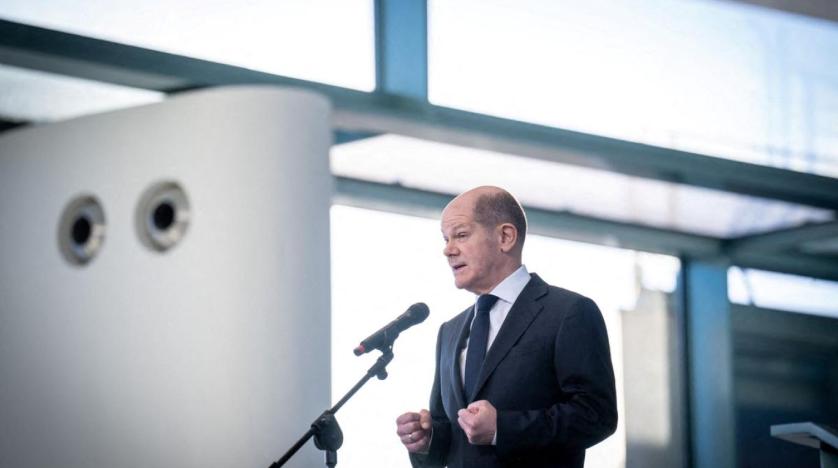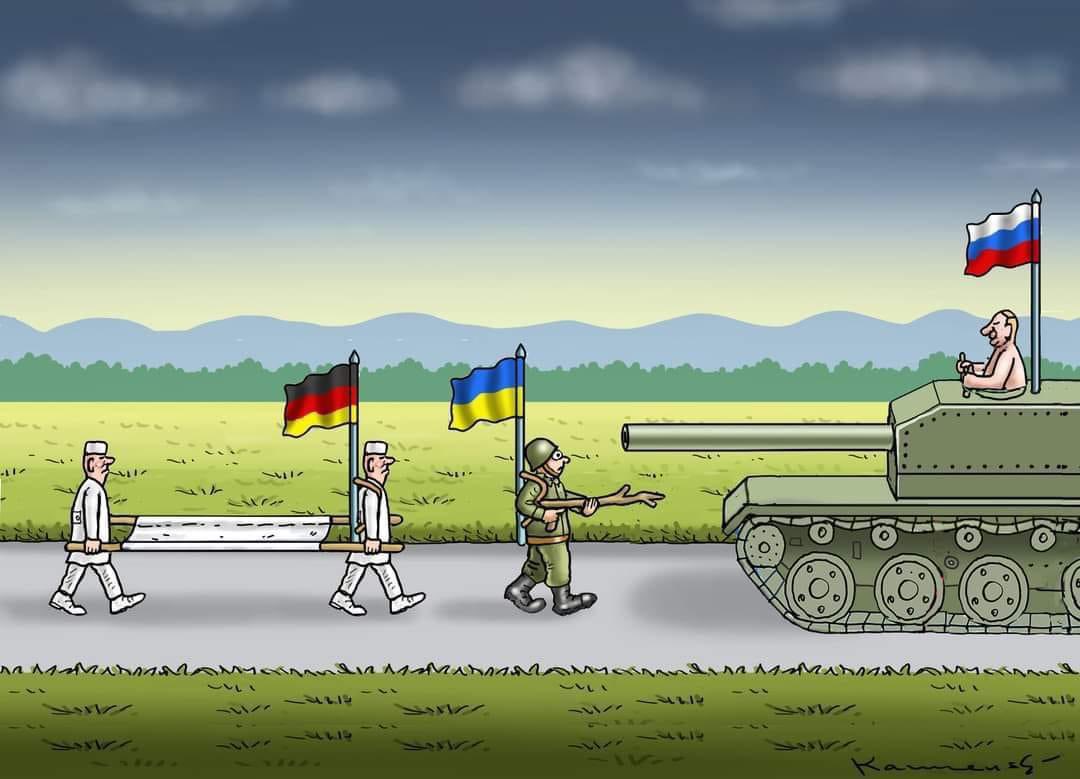Observers in Washington say Germany’s Social Democratic Party’s soft stance towards Moscow has a long history

Istanbul / İnci Mecdi Asharq Al-Awsat
Berlin has rejected Kiev’s request to buy advanced defensive weapons, despite Russia’s heavy military buildup near the Ukrainian border. Angered by the situation, the Ukrainian government accused Germany of encouraging Vladimir Putin. The Ukrainian government believes that Russian President Putin is ‘preparing to invade Ukraine in response to the unfriendly practices of Western countries that threaten Russia’s security’. Kiev has called for binding guarantees to prevent the North Atlantic Treaty Organization (NATO) from expanding eastward.
Ukraine and Western countries are concerned about Russia’s invasion of Ukraine after its annexation of Crimea in 2014. Since then, Russia’s support for separatists in the Donbas region and fighting in the east of the country have continued.
Nato, meanwhile, has so far failed to defuse diplomatic tensions over the issue, as it resists Russia’s withdrawal from an earlier 2008 statement on the acceptance of Ukraine and Georgia as NATO members and its demand that Russia, which the Kremlin considers a clear threat, be given legally binding guarantees against arms sales to neighboring countries.
Ukraine’s ambassador to Berlin, Andrey Melnik, told the German News Agency (DPA) on Wednesday last week that his country is looking for warships to help it defend the Black Sea and Azov Sea coasts against possible Russian invasion. Ambassador Melnik added that German-made warships are ‘among the best in the world’, Sharki’l Avsat reported, quoting Independent Arabia.
However, a German government spokesman said Berlin was reluctant to send ships to Ukraine, German media reported. German Chancellor Olaf Scholz and Foreign Minister Annalena Baerbock rejected similar requests earlier this week, the reports said.
The shame of the past
During his visit to Kiev, Baerbock referred to the horrific crimes committed by the Nazi regime in Germany against the Soviet Union during World War II, noting that there are a number of historical reasons for Germany’s current position. The horrific crimes committed by the Nazis, a black mark in German history, are a sensitive issue for Germans who are ashamed of them and therefore adopt anti-war policies.
German Defence Minister Christine Lambrecht told German media that the German Federal Government now believes arms shipments to Ukraine are a useless step. Minister Lambrecht confirmed Germany’s support for Ukraine, saying it would provide medical assistance, including a field hospital worth 5.3 million euros ($6 million).
Berlin also provided Kiev with breathing apparatus and wounded Ukrainian soldiers were treated in hospitals in Germany, he said.
Lambrecht’s statements became the material for sarcastic drawings of cartoonists in other parts of Europe. Famous cartoonist Marian Kamensky pointed out that Europeans see Germany’s stance as ‘disappointing’ with a cartoon of a Russian tank shooting at a Ukrainian soldier he was waiting to intervene in when German medics were injured.

However, in an interview with German Radio (Deutschlandradio), Dr. Marcel A. Dirsus of the Institute for Security Policy (ISPK) at the University of Kiev stated that “the idea of Germany supplying weapons that can be used to kill Russians is unacceptable to many Germans.”
Ukraine angry
Berlin’s stance sparked outrage in Kiev, which summoned Germany’s ambassador to Kiev, Anka Feldhusen, to the Foreign Ministry on Saturday. During a visit to India last Friday, German Navy Commander Kay-Achim Schönbach said that “the Crimean peninsula is gone, it will never come back, it is a fact”, as well as questioning western countries’ views on Putin’s intentions regarding Ukraine, and that the German Ambassador was summoned to the ministry for remarks that the Russian President deserved ‘respect’, the Ukrainian Foreign Ministry said in a statement. Specified.
Schoenbach, who apologized after his remarks, said his remarks were ‘reckless’ and was forced to resign. The German Defense Ministry announced that it disapproved of Schoenbach’s statements. Schoenbach’s statements did not coincide with the position of the German Defense Ministry, a spokesman for the ministry said.
Germany’s refusal to send weapons to Ukraine contradicts the positions of Britain, Poland and the Baltic states, which warn that it could lead to a split between European countries against Russia.
The defence ministers of Estonia, Latvia and Lithuania issued a joint statement announcing that they have received U.S. approval to send the Stinger Air Defense Guided Missile System and Javelin anti-tank missiles to bolster Kiev’s defenses.
Germany’s position is not the result of a sudden development, nor is it limited to the new ruling coalition government. Last June, while former German Chancellor Angela Merkel of the Christian Democratic Union of Germany (CDU) was still in office, Berlin expressed opposition to the idea of supplying arms to Ukraine in response to statements by Ukrainian President Volodimir Zelenski, who said he expected military assistance from Germany.
German Foreign Minister Heiko Maas confirmed at the time that his country rejects the idea of arming, while stressing that his country, along with France, is leading Western diplomatic efforts to resolve the dispute between Moscow and Kiev within the framework of the ‘Normandy format’ and germany’s support for Ukraine in terms of aid and diplomatic talks.
Some German politicians, however, argue that the issue needs to be re-examined because there is a threat to Ukraine’s sovereignty, as some members of the CDU, now on the opposition wing, have criticised the new government.
Henning Otte, spokesman for defense policy for the German Parliamentary Group, told Bild newspaper that “we cannot reject Ukraine’s request for defensive weapons that could prevent a possible Russian attack.”
North Stream 2 Pipeline
Germany’s new government has set a clear goal of imposing further restrictions on arms sales and exports, including from European Union (EU) countries, while Western media report a division over Russia in general within the ruling coalition headed by Prime Minister Olaf Scholz of the Social Democratic Party (SPD) and partners of the Green Party and the Free Democratic Party (FDP).
According to Western media, the ruling coalition agrees on a strict policy for arms exports, which includes no arms supplies to crisis-seizing regions, but they cannot agree on the Planned North Stream 2 Pipeline, which is scheduled to transfer natural gas from Russia to Europe.
Critics of the North Stream 2 Pipeline project see it as a geopolitical weapon that Moscow could use against Ukraine or the EU, while the United States has threatened to impose sweeping sanctions on the project if Russia launches an attack on Ukraine.
However, senior SPD politicians, including Defence Minister Lambrecht and SPD Youth Organisation President Kevin Kühnert, defended the North Stream 2 Pipeline project. Minister Lambrecht said last week that the project should not be in any way associated with Russia-Ukraine tensions.
This has raised questions about Germany’s seriousness and EU warnings to Moscow that any aggression targeting Ukraine would have ‘serious consequences’, Politico reported.
The US-based magazine noted that Chief Minister Scholtz took a softer stance against the project last month, referring to it as a special economic project with no political dimension, but that the north stream 2 pipeline’s discussion as an economic project was a topic that was hotly debated by Kiev and countries in the east of the EU, including Poland and the Baltic states.
Observers in Washington say the SPD has a long history of taking a softer stance toward Russia, especially starting with the policy of Willy Brandt, a former SPD prime minister of Germany who sought to establish diplomatic relations with the Soviet Union and communist Eastern European countries in the late 1960s and early 1970s.
In addition, Gerhard Schroeder, a former prime minister of Germany with the SPD, became a symbol of the close economic relations with Moscow as chairman of the shareholders committee of the North Stream project.
However, some SPD members are now pushing for a tougher stance against Moscow. Michael Roth, germany’s former Minister for Europe and chairman of the Federal Parliament’s Foreign Relations Commission, told Politico that “if military tensions against Ukraine increase, everyone needs to know that we will not conduct business with Russia as usual.”
Roth said.
“The EU should put all options on the table, including the North Stream 2 Pipeline project. We can’t go on like we used to. This is not just an issue concerning Germany, it is an issue that needs to be discussed in coordination with the EU.”
source: Asharq Al-Awsat
